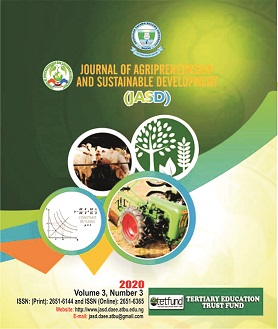FACTORS INFLUENCING PADDY MILLING IN ADAMAWA STATE, NORTH-EASTERN NIGERIA
DOI:
https://doi.org/10.59331/jasd.v3i3.132Keywords:
Adamawa, Akaike information criteria, Bayesian information criteria, Milling, PaddyAbstract
The research examined the factors influencing paddy milling in Adamawa State, Nigeria based on data generated from 160 paddy millers via multi-stage sampling technique. In the research, four major functional forms of Ordinary Least Squares (OLS) regression were modeled; linear, semi log, exponential and double log functional forms to unravel the predictors of paddy processing in the area. Diagnostic checks revealed the data set as free from heteroscedasticity, multi collinearity and autocorrelation. Having passed the diagnostic checks, the least square regression in the study was adjudged robust; reliable and stable. However, of the four (4) functional forms modeled in the study, the double log function returned best fit in terms economic, statistical and econometric criteria and used to derive the conclusion of the study. The double log result had the highest R2 value of 74.99%, lowest Root Mean Square Error (RMSE) of 0.348, lowest Akaike Information Criteria and Bayesian Information Criteria of 122.95 and 144.47, respectively. In terms of estimated coefficients, the double log result revealed that paddy (X1), labor (X2), firewood (X3) and milling cost (X6) were all significant at P≤0.01. Thus, paddy, labor, firewood and milling cost were adjudged significant factors that influence paddy processing. The study recommended the need for effective allocation of those variables in the right quantities and time for optimum output of milled rice.
Downloads

Downloads
Published
How to Cite
Issue
Section
License
Copyright (c) 2022 Journal of Agripreneurship and Sustainable Development

This work is licensed under a Creative Commons Attribution 4.0 International License.






